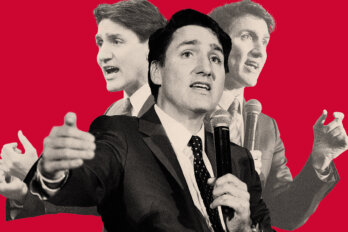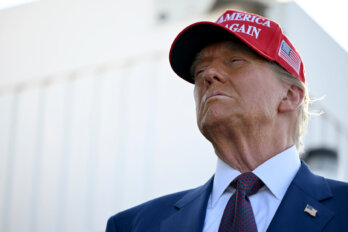A little less than a year before the 2020 election in the United States, it has become clear that foreign interference will shape the outcome. On October 23, the White House Office of Management and Budget announced that, if the Senate Republicans don’t kill it first, the president would veto the congressional bill against foreign interference, citing how “ambiguous language would ensnare American citizens and entities acting in good faith in its web of requirements and prohibitions.” Facebook, in the name of freedom of speech, has maintained its disastrous open stance on political advertising, refusing to distinguish between true and fraudulent information. For the next election, at least, the political and technological elite of the United States has declared their country’s political and media systems wide open to manipulation. America’s enemies have understood this opportunity since at least 2015. Now, the question for its friends is how to engage.
Liberal democracies with interests in preserving the postwar international order are faced with an ugly choice: nobody wants to interfere in a foreign country’s election, but if we don’t, the Russians and other bad actors will go totally unopposed. The consequences have been severe for everyone, but the stakes for Canada are clearer than for any other country. The consequences of the Trump administration have been unforgettable: being labelled a “national security threat” by the country with the most powerful military in the world and having our most important trade deal threatened. As it stands, Canada cannot afford not to interfere. Our core economic interests are a stake. Our political safety is at issue.
Current memetic warfare—the use of social-media networks to achieve foreign-policy ends—has the US presidency as its greatest prize. The Russians have shown how extraordinarily effective memetic techniques can be. To take just a small example, from a report by Oxford University’s Computational Propaganda Research Project and social-network intelligence company Graphika, the Russian trolls at the so-called Internet Research Agency (the primary troll farm) used social-media networks to target African American voters in order to encourage them to vote for third parties and to depress their turnout by stoking distrust in democratic institutions. The meme campaign was exceptionally ambitious, involving Twitter handles, Facebook pages, Instagram posts, YouTube personalities, and even a fake geopolitical think tank.
It was also cheap. In the lead up to 2016, the monthly budget of the Internet Research Agency (IRA) was reportedly $1.25 million (US) a month, a little more than a single M1117 Armored Security Vehicle. That staggeringly low sum of money has helped Russian flags replace American ones in Syria while Russian encroachment into Ukraine has been met by bare-minimum US resistance. Waging memetic warfare on the United States, as opposed to any other kind of conflict, also comes with almost no risk. The consequences for Russia have been negligible—a few economic sanctions. The lesson for other countries should be obvious: even if American authorities discover the manipulation, they will do little or nothing about it. And, if you don’t attempt to manipulate the American system, the consequences can be drastic.
We do not of course have the luxury of the simplicity of Russian goals, which are to spread division and chaos, although it did so with a clear purpose in mind: the election of Donald Trump. Canada should interfere in the 2020 election only with similarly clear goals. The first goal should be a strong and secure trade agreement. The current iteration of NAFTA has not been ratified by Congress yet. Nearly two million trade-related Canadian jobs depend on it. In 2016, 77.8 percent of our merchandise exports were with NAFTA partners. The American left and right have, at various times, used opposition to the agreement as a stand-in for fighting for American workers, and our allegiance simply does not register in their calculations. Bernie Sanders, for example, has been virulently opposed to NAFTA throughout his career. If he were elected, the nightmare of the past few years’ negotiations could easily be repeated.
The second goal should be the preservation and strengthening of American democracy. The challenge to American democracy is very real. Recently, the Electoral Integrity Project declared that North Carolina had deteriorated to a “partly free” democracy, on the level of Iran or Venezuela. That the libertarian and conservative battle cry—“We’re a republic, not a democracy”—is finding new currency should frighten every Canadian. A soft autocracy to our southern border—far from an impossible scenario—would be a disaster to our interests, not just our values. Even Quebec separatists should be able to understand that. Already, with the influx of asylum seekers crossing over in Canada, we have seen the consequences of America’s hostile refugee policy on our own attempts to control the flow of migrants at the border. Autocrats are unpredictable. One attached to the world’s most powerful military, just across the world’s longest border between two countries, would be a constant force for destabilization. Canada is, geopolitically, a small country; its power and its security rest on the existence of a rules-based international order. That rules-based order has been supported, since the end of the Second World War, by a strong America devoted to democracy. These goals transcend Canadian party lines. Needless to say, the candidates we should attempt to disrupt and promote would be neither one party nor the other: the anti-trade left or the anti-democratic right.
We already interfere in American politics when it comes to our national interests, especially when our trade interest is at stake. During the USMCA negotiations, Canada, as well as China and Mexico and the European Union, targeted its tariffs to hurt the districts of individual members of Congress—whisky tariffs for Mitch McConnell, cranberry tariffs for Paul Ryan. Tariffs are a blunt instrument, though, extremely costly and not particularly effective.
Canada is much too small to compete in traditional geopolitics, but in memetic terms, we might well be quite successful. We understand American politics and culture vastly better than Russia or China ever will. There are around 800,000 Canadian citizens living in America, and about 622,000 eligible US voters living in Canada. That would give our interference agency a familiarity with the material that the IRA could only dream of. The Russians gave us a good plan to start. But a group of Canadian trolls, who set out to sink anti-democratic Republicans and anti-trade Democrats through the manipulation of social-media networks, would know just what to say and how to say it.
In 2010, during his State of the Union in the aftermath of Citizens United, Obama described the obvious vulnerability opened up by that decision: “The Supreme Court reversed a century of law that I believe will open the floodgates for special interests—including foreign corporations—to spend without limit in our elections.” During that line, Justice Samuel Alito frowned and mouthed “not true.” Well, Obama was right and Alito was wrong. Nine years later, even plain evidence has led to no change in law or policy. We are America’s friends. It goes without saying that, if America passed laws against interference in their elections, or if Facebook banned political advertising, we would stop. But, at a certain point, to not make moves in the corrupt game you’ve been given to play is irresponsible.





